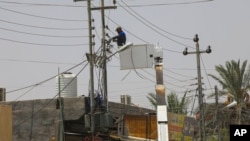Iraq's top military commander and prime minister say they have a plan to stop Islamic State terrorists from creating more power blackouts.
Iraqi state TV reported Saturday that four IS terrorists had been captured in the regions of Kirkuk, Nineveh, Salaheddin and Anbar province, in the wake of recent attacks on the country's electricity grid, including one Friday that left a large swath of Baghdad without water.
Interior Ministry spokesman General Saad Maan told the TV service that security forces have had some success in foiling recent attacks. He said 23 attempts to damage electricity pylons had been thwarted in the past few days.
Prime Minister Mustafa Kadhimi tweeted Friday that the terrorists behind the recent attacks "do not wish the country well" and are "becoming desperate in the face of Iraq's success in increasing electricity production."
Military to be held responsible
Iraqi military commander General Tahsin Khafaji told journalists that a plan had been put in place to stop further attacks on the electricity network.
He said that military commanders would be held responsible for the electricity lines and towers in their respective sectors. He said that any failure would be investigated and that those responsible would be held accountable.
Khafaji said all the attackers who had been caught "have ties to the Islamic State terrorist group," and that his forces were "trying to find out who is giving them information on the electricity towers and who is funding them."
Electricity Ministry spokesman Ahmed Moussa told journalists that efforts to stop the terrorists were being expanded.
He said efforts to damage the electricity network weren't new but were now occurring at substations inside cities, targeting drinking water, water purification and hospital operations. So, he said, military, intelligence and security efforts are being made to stop further attacks.
Khattar Abou Diab, who teaches political science at the University of Paris, told VOA that Iraqi officials like to blame Islamic State for many problems, but the electricity crisis is not new and various forces would like to stop a plan by Egypt, Jordan and Iraq to link electricity networks among the three nations.




